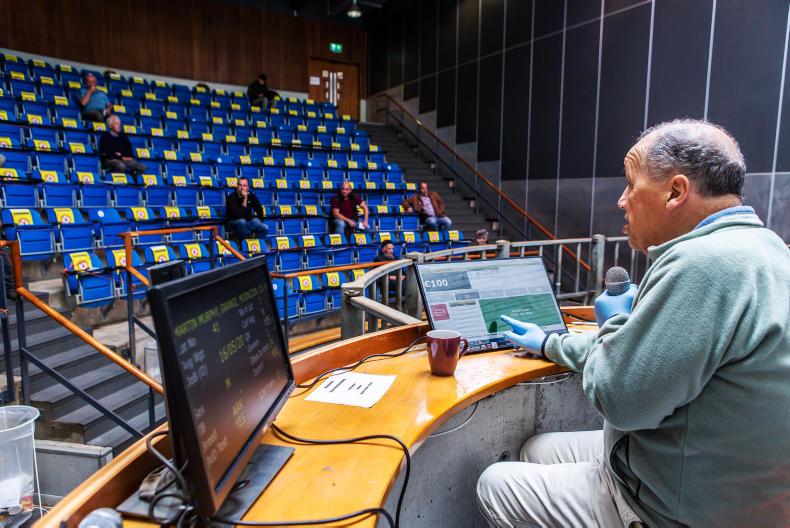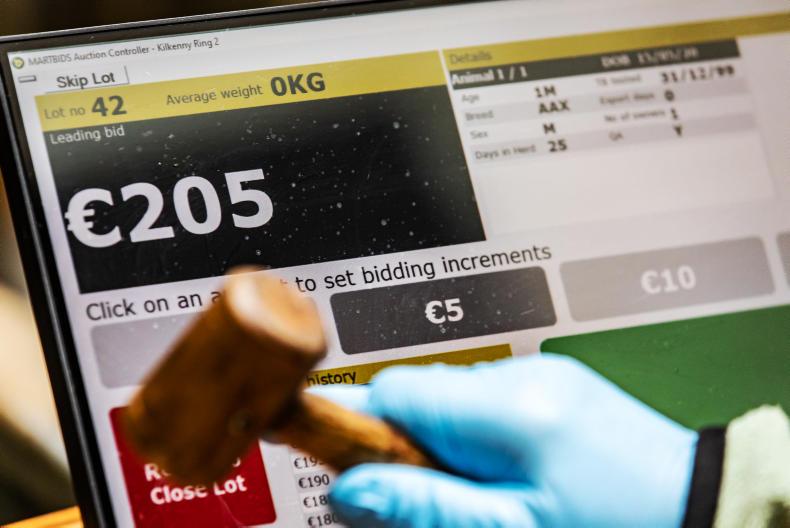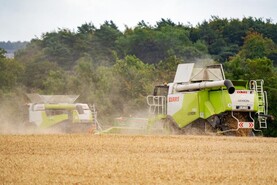“The bid is online now, the bid is on the telly, the bid is outside now, make no mistake, on me screen now lads” and “it’s on the net now lads, it’s on the net, its on the net.” All phrases you will have heard on a regular basis if you walked into any livestock mart over the last few weeks.
They refer to the new regime of online bidding that many marts have implemented over the last few months. As the saying goes; “necessity is the mother of invention” and you couldn’t find a truer phrase for what has happened in marts. They deserve huge credit for what has been implemented up and down the country.
Who would want to be a mart manager in the last six months?
Prior to COVID-19, marts were already struggling with a number of issues, including increased scrutiny around health and safety, which led to a number of marts having to invest heavily in new safety arrangements around the ring area and lairage areas.
New health and safety rules also meant marts had to implement strict procedures around closing off lairages at specific times during the sale – some of which were very unpalatable to sellers and purchasers.
This, coupled with increased insurance premiums in an already low margin business meant that some marts were under pressure.
Add COVID-19 to the mix and you might ask the question: Who would want to be a mart manager in the last six months?
The announcement on 13 March 2020 that the country was going into lockdown was a massive blow to the country’s marts.

Farmers get used to dealing with strict COVID-19 measures and the mart and online sales driving up price through the martbids system at Kikenny Mart as it reopens the auction at the ring. \ Philip Doyle
March, April and May are traditionally three of the busiest months for livestock sales every year, with thousands of calves moving through sales rings and grass cattle moving from west to east.
Marts cobbled together tender sales, where buyers were allowed to view stock and then submit their best price. A cumbersome system that was better than nothing, but wasn’t liked by buyers or sellers.
Sellers felt they weren’t getting enough and buyers couldn’t bid on too many animals, as they didn’t know how many they would get. This led marts to online selling.
Some said it wouldn’t work and others said it would die off when things get back to normal.
There had been some development work completed in recent years by a number of online sales providers, including ourselves, but the appetite wasn’t there to implement the changes required to launch online selling.
COVID-19 changed all of that and now the vast majority of marts offer online bidding alongside ringside bidding at sales. It is going well, with some marts reporting new custom as a result of the online offering.
Some said it wouldn’t work and others said it would die off when things get back to normal. Some are now asking will there ever be a normal again. While the numbers being sold online remain low, it’s important that the option is there for the future, in the event of further lockdowns taking place.
It could also become a useful tool for part-time farmers to keep an eye on selling animals, rather than go to the bother of taking time off work and attending the mart.
Progress
Marts have shaken themselves off and stepped up to the plate once again. The importance of marts to farmers has never been more evident.
Selling animals in a fair and transparent way is one of the key benefits of marts. Everyone knows where they stand and it’s a secure payment.
If there was any way of supporting the marts, who have invested in the technology with a type of retrospective grant, it would be money well spent
Marts have invested huge amounts of money on their own bat, without any help.
If there was any way of supporting the marts, who have invested in the technology with a type of retrospective grant, it would be money well spent and go some way towards guaranteeing marts are there to service their farmer clients in the future.
For now, we can be confident that no matter what comes down the road, Irish marts will deal with it and find a way to keep buying and selling – let that be online or ringside.
“The bid is online now, the bid is on the telly, the bid is outside now, make no mistake, on me screen now lads” and “it’s on the net now lads, it’s on the net, its on the net.” All phrases you will have heard on a regular basis if you walked into any livestock mart over the last few weeks.
They refer to the new regime of online bidding that many marts have implemented over the last few months. As the saying goes; “necessity is the mother of invention” and you couldn’t find a truer phrase for what has happened in marts. They deserve huge credit for what has been implemented up and down the country.
Who would want to be a mart manager in the last six months?
Prior to COVID-19, marts were already struggling with a number of issues, including increased scrutiny around health and safety, which led to a number of marts having to invest heavily in new safety arrangements around the ring area and lairage areas.
New health and safety rules also meant marts had to implement strict procedures around closing off lairages at specific times during the sale – some of which were very unpalatable to sellers and purchasers.
This, coupled with increased insurance premiums in an already low margin business meant that some marts were under pressure.
Add COVID-19 to the mix and you might ask the question: Who would want to be a mart manager in the last six months?
The announcement on 13 March 2020 that the country was going into lockdown was a massive blow to the country’s marts.

Farmers get used to dealing with strict COVID-19 measures and the mart and online sales driving up price through the martbids system at Kikenny Mart as it reopens the auction at the ring. \ Philip Doyle
March, April and May are traditionally three of the busiest months for livestock sales every year, with thousands of calves moving through sales rings and grass cattle moving from west to east.
Marts cobbled together tender sales, where buyers were allowed to view stock and then submit their best price. A cumbersome system that was better than nothing, but wasn’t liked by buyers or sellers.
Sellers felt they weren’t getting enough and buyers couldn’t bid on too many animals, as they didn’t know how many they would get. This led marts to online selling.
Some said it wouldn’t work and others said it would die off when things get back to normal.
There had been some development work completed in recent years by a number of online sales providers, including ourselves, but the appetite wasn’t there to implement the changes required to launch online selling.
COVID-19 changed all of that and now the vast majority of marts offer online bidding alongside ringside bidding at sales. It is going well, with some marts reporting new custom as a result of the online offering.
Some said it wouldn’t work and others said it would die off when things get back to normal. Some are now asking will there ever be a normal again. While the numbers being sold online remain low, it’s important that the option is there for the future, in the event of further lockdowns taking place.
It could also become a useful tool for part-time farmers to keep an eye on selling animals, rather than go to the bother of taking time off work and attending the mart.
Progress
Marts have shaken themselves off and stepped up to the plate once again. The importance of marts to farmers has never been more evident.
Selling animals in a fair and transparent way is one of the key benefits of marts. Everyone knows where they stand and it’s a secure payment.
If there was any way of supporting the marts, who have invested in the technology with a type of retrospective grant, it would be money well spent
Marts have invested huge amounts of money on their own bat, without any help.
If there was any way of supporting the marts, who have invested in the technology with a type of retrospective grant, it would be money well spent and go some way towards guaranteeing marts are there to service their farmer clients in the future.
For now, we can be confident that no matter what comes down the road, Irish marts will deal with it and find a way to keep buying and selling – let that be online or ringside.







 This is a subscriber-only article
This is a subscriber-only article









SHARING OPTIONS: